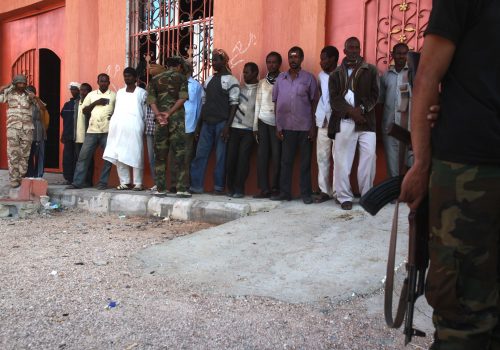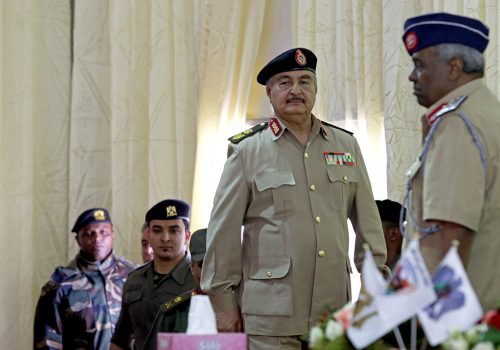Egypt recalibrated its strategy in Libya because of Turkey
Although the restarting of the political peace process in Libya refocused attention on domestic actors, it is still necessary to look at the external players’ moves to assess the possibility of real appeasement among rival Libyan factions. Cairo is one of the main capitals to pay attention to.
As is well-known, after the 2014 Egyptian presidential elections, Abdel Fattah al-Sisi gave his full military, logistical, and intelligence support to the eastern-based Libyan National Army’s (LNA) chief General Khalifa Haftar, considering him the ideal candidate to restore stability in Libya, protect Egypt’s strategic interests, and avoid direct and costly intervention in the country. However, the failure of Haftar’s military campaign in 2019-2020 disrupted the Egyptian strategy and forced Cairo to reconsider its plans, reducing its support for the general while being open to a hypothetical political solution.
Cairo’s recent restoration of diplomatic ties with Tripoli’s Government of National Unity precisely represents Sisi’s attempt to recalibrate his strategy in order to avoid a military escalation that the country cannot afford, given that the Egyptian government is already engaged on several fronts (from the terrorist threat in the Sinai Peninsula to the Grand Ethiopian Renaissance Dam dispute). Unlike the United Arab Emirates, which has continued to support Haftar unabated until at least one month ago, according to European sources, Egypt has bet on relaunching the diplomatic path, appearing as the most compromise-seeking actor among the Libyan general’s backers.
Egypt is well aware that its national security and internal stability are inevitably intertwined with Libya’s. This is one reason Egypt announced a redline about western militia advancement toward its border in June 2020 and immediately accepted the ceasefire proposed by the Government of National Accord in August 2020, backing the efforts of the United Nations Support Mission in Libya to resume a national dialogue between the rival parties. Egypt supported the ceasefire signed in Geneva on October 23, 2020.
Currently, the Egyptian government seems willing to support the new Libyan executive authority led by Prime Minister Abdel Hamid Dbeibah, as demonstrated by the proposal to reopen the Egyptian embassy in Tripoli, as well as by the signing of several memorandums of understandings in fundamental sectors—including energy, communications, infrastructure, investments, and transport—during the Egyptian prime minister’s visit to the Libyan capital in April. A visit to Cairo by the US Special Envoy to Libya in May laid the groundwork for new areas of cooperation between Egypt and the US in Libya.
Thus, it is evident that the strategic pivots of Egyptian leadership in Libya are adapting and evolving in concordance with developments on the ground and keeping in mind wider regional implications—particularly its relations with Turkey, which deteriorated as a consequence of Ankara’s support to the Muslim Brotherhood after the 2011 revolt. In this phase, it becomes crucial for Egypt to cautiously distance itself from the Saudi and Emirati strategy to envisage a more autonomous and peace-facilitating role on the Libyan dossier. At the same time, it is in Cairo’s interest to show greater moderation on the international level to avoid possible conflicts with the new US administration.
Additionally, moderation is necessary on the regional level with Turkey to assess the possibility of a convenient rapprochement with Ankara. Within this new scenario, a pillar of Cairo’s strategy is security sector reform in Libya. Indeed, any attempt to stabilize Libya cannot be divorced from a unified Libyan national armed forces, purged of the presence of militias and foreign fighters, and not bent on the personal aspirations of any politician. At the same time, it appears that Cairo is struggling to find a role in the future armed forces—to be created through security sector reform—for General Haftar and the men of his circle, since his marginalization could lead to a dangerous strengthening of armed groups aligned with Turkey in Libya and a rise in the influence of Tripoli’s militias, especially since the current political process is not yet defined.
Therefore, there are reasons for the resumption of an official diplomatic dialogue between Cairo and Ankara. During high-level bilateral talks held in Cairo on May 5-6, the two sides defined the main areas of cooperation for the near future: Libya and the common need to achieve greater stability in the Eastern Mediterranean region.
However, Egypt has so far responded cautiously to Turkish overtures because, despite the elements in favor of a possible “Grand Bargain” between the two countries, there are still too many conflicting interests, especially regarding Libya. At a military level, Turkey could accept the withdrawal of the thousands of Turkish-sponsored Syrian mercenaries from Libya (the number is difficult to assess with precision), maintaining, however, a lasting military presence according to the 2019 Turkish-Libyan defense agreement. This position is completely unacceptable to the Egyptian government, which will not retreat from its condition that both Turkish forces and affiliated mercenaries should leave the country.
Egypt fears that Ankara’s military patronage of Tripoli combined with the long-lasting Turkish support for the Muslim Brotherhood could create an Islamic-oriented government in Tripoli. This is a risk that Egyptian President Sisi does not want to run, not even for a general agreement with Ankara, because he considers the organization a national security threat. In 2013, President Sisi ousted manu militari the former Islamist president Muhammad Morsi. As a result, Egypt continues to see the Libyan situation through the lens of securitization. Despite a diplomatic push, the Egyptian decision-making process is still dominated by a security obsession—to the point that foreign policy on Libya is shaped by the intelligence and security apparatuses closest to Sisi, and not by the foreign ministry.
For Egypt, an agreement with Turkey could preserve Egypt’s military, political, and economic role in Cyrenaica—the eastern coastal region of Libya where the LNA is based—and present the opportunity for strengthened economic ties with Libya. Moreover, if acting in tandem, Cairo and Ankara would have a combined ability to catalyze a political solution in an extremely fragile Libya, while protecting their interests on the ground, as no other regional or European actors have proven able to do. This opportunity should not be wasted due to the lack of mutual confidence. In fact, Libya could prove to be a confidence building scenario between the two key regional players, which could eventually lead to improved regional strategies for issues like energy and the future of Syria.
Alessia Melcangi is TT Assistant Professor of Contemporary History of North Africa and the Middle East at Sapienza University of Rome, Non-resident Senior Fellow with the Rafik Hariri Center and Middle East Programs at the Atlantic Council and Associate Research Fellow at ISPI.
Image: Libya's Prime Minister Abdulhamid Dbeibeh greets his Egyptian counterpart Mustafa Madbouly in Tripoli, Libya, April 20, 2021. REUTERS/Hazem Ahmed


